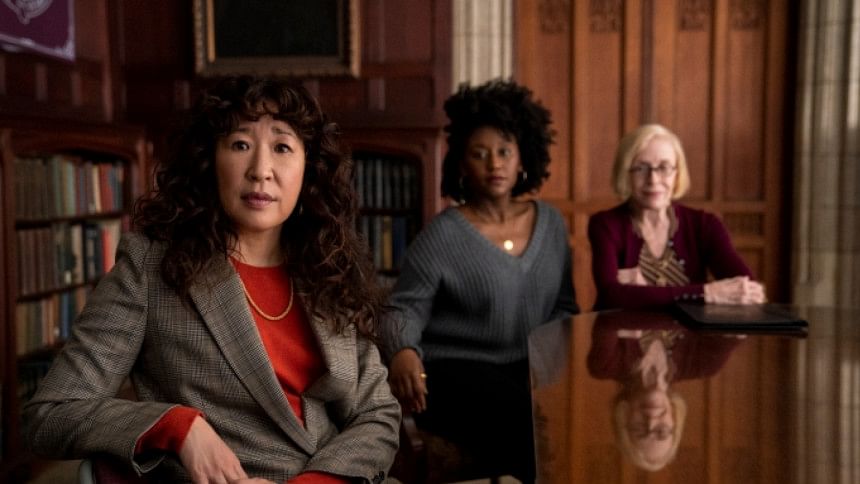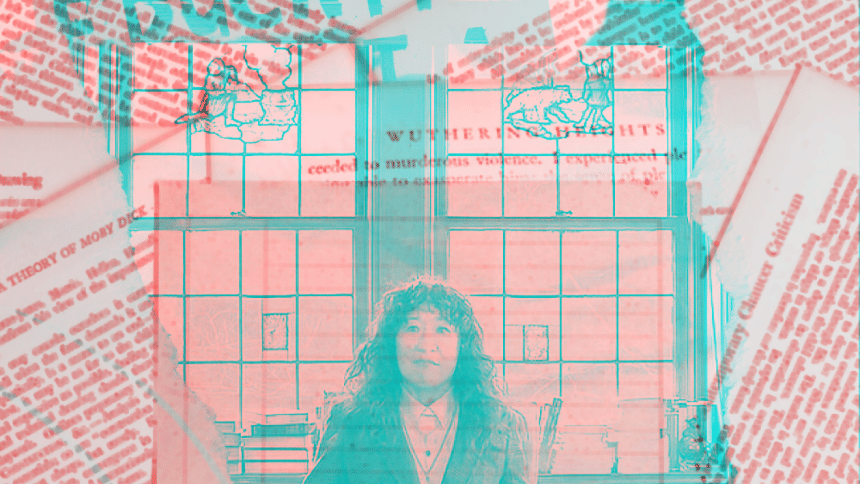Cosy comedy-drama ‘The Chair’ does right and wrong by English departments

Netflix's new comedy-drama, The Chair (2021), should fit right up the alley of any and possibly every lit major or graduate. The six-episode series which premiered on August 20, 2021 takes us through the campus doors of the fictional Pembroke University, where Professor Ji-Yoon Kim will start her tenure as the first-ever female English chair in the glaringly white-and-male history of the university. The Chair, fronted by the always-great Sandra Oh, is the rare campus drama centred on the teachers and administrators, the Chaucer spouters and Melville-thumpers, the New Critics and the failed-writers. Somehow—and this occurs as early as the first episode—the show makes glamorous and addictive television out of it all.
For all the college-goers who saw their professor, dishevelled and out of sorts, bent over a mountain of paperwork at their desk, and never wondered to themselves what lives they may lead outside university walls, this series is the one to open eyes. The spectacularly un-magnificent and captivating human lives of faculty members are presented here almost like bildungsromans. We are shown a core group of teachers, each touching upon archetypal 'literature professor' types, from the sleep-inducing kind to the 'cool teacher', along the way.
Jay Duplass of Duplass Brothers fame plays the latter, with his Professor Dobson, a grieving, charming, slovenly wreck who instigates the large arc of the first season when he half-drunkenly Sieg Heils in front of a packed classroom, which in his defence was a harmless if unwise gesture to illustrate a philosophical point. The scene wherein this occurs is shot masterfully. We are at first drawn into a narrative of self-recovery for the grieving professor, with Dobson fumbling and mumbling through the beginning of a promising lecture—or so it seemed. The admittedly "white" and "not Jewish" professor spontaneously throws up the inappropriate salute, which his students—who we are routinely told all "love him"—catch the awkward moment on their phones, spreading within minutes a meme that will bring about a reckoning.

Where The Chair excels most is how much it makes one root for its characters—the ones we are meant to like anyway. It is hard not to sympathise when rampant acts of misogyny clutter the paths of its female lecturers, all of whom seem grossly more qualified than their male counterparts. It is easy to feel sympathy for overwhelmed Dobson, who really can't seem to "get his [act] together." Just as well, the hordes of students with scrunched-up faces that picket the campus lawns seem loathsome and ignorant—painting Dobson, for us viewers, as the real victim in the whole matter.
It must be said that in building mostly unnuanced "us and them" distinctions between the two sides, there is some weightless storytelling here. The manner in which the enraged students are portrayed had to have been intentional. There wasn't a scene in which I saw a student speak that didn't make my teeth grind (save for maybe Ella Rubin's Dafna, who seems poised for a larger role in the second season). The nameless cluster of fashionably offended students, with all their pith and vinegar, seemed to encapsulate some vague sort of comment on cancel culture, that took more than it added to the show.
Its treatment of the elderly is similarly a little muddled. Deployed as either comic relief or villainous foils, the older characters don't get the fairest shake in The Chair. Only Joan Hambling, played excellently by small screen-veteran Holland Taylor, is exempt, showcasing a character beyond that of a tsk-tsking grump. That being said, the increasing senescence of Professor McHale is quite hilarious.
It goes without saying that The Chair is one for literature majors. If its plot points and visuals weren't enough, its soundtrack sounds ripped from the playlist of any self-serious sophomore. Though fitting, a soundtrack filled with Vampire Weekend, The Smiths, Elvis Costello, and Vivaldi—and maybe two artists of colour—might be a little too white. In other words, it is the complete college experience.
Mehrul Bari S Chowdhury is a writer, poet, and artist. His work has appeared in Blood Orange Review, Kitaab, and Sortes Magazine, among others.

 For all latest news, follow The Daily Star's Google News channel.
For all latest news, follow The Daily Star's Google News channel. 








Comments